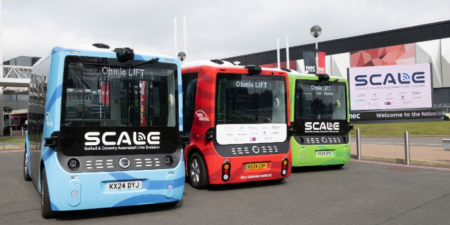The UK’s Centre for Connected and Autonomous Vehicles (CCAV) has announced the 13 projects that will receive funding as part of its Commercialising Connected and Automated Mobility: Supply Chain competition (CCAMSC), which seeks to improve the safety and security of self-driving vehicles and accelerate their rollout.
The grants, which total £28.5m in joint UK Government and industry support, will help 43 British companies across the 13 projects seize early opportunities to develop self-driving technologies, products, and services ready for the connected and automated mobility market.
The projects seek to fill specific CAV technology gaps, improve performance and reliability, and identify scale-up opportunities in the UK and globally. The grants, part of CCAV’s Connected and Automated Mobility program, will complement the UK Government’s £81 million investment for CAM technology.
Delivery partners
The 13 projects will be delivered in partnership with CCAV’s delivery partners, Zenzic and Innovate UK to bring together government and industry to support the development of sovereign capabilities within the UK CAM supply chain.
Phillip Ironside, head of innovation and programs at Zenzic, said, “Our vision foresees the early commercial deployment of self-driving vehicles by 2025 to improve the movement of people and goods. This is only possible with a vibrant and sustainable UK-based CAM supply chain, which can secure the UK’s position as a world-leading exporter of CAM services.
“Unlocking the CAM potential requires a coordinated supply chain, and the participation of the entire CAM ecosystem. By bringing together a wide range of market participants, from large OEMs and Tier 1 suppliers to smaller technology developers and micro-businesses, these innovative projects are driving progress,” he added.

The CCAMSC winners
1. AIM-DBW
The project aims to deliver a universal and affordable drive-by-wire system that replaces traditional mechanical linkages with electronic ones. This system enables automation of the throttle, steering, braking, gears, and ancillary systems of a vehicle.
Partners: Aim Technologies (Lead), TRL Limited
Grant funding: £400,000
2. Autonomous Cargo
This project focuses on creating an autonomous dolly for airside cargo movements. Building on previous experience with smaller baggage dollies, the project will develop a unique autonomous airside 7.5t cargo dolly. Additionally, a simulation tool will be developed to quantify the benefits of CAM for air cargo operations, providing operators with insights into optimal CAM vehicle types or required infrastructure modifications.
Partners: Aurrigo (Lead), UPS
Grant funding: £480,000
3. CERTUS
The verification and validation of ADS presents unique challenges. CERTUS provides a toolset that helps to efficiently identify, define, and execute the test requirements for an ADS. It addresses three key questions: what to test, how to test, and when to stop testing. The project partners will collaborate to develop and demonstrate effective testing methodologies.
Partners: Horiba Mira (Lead), Coventry University, Connected Places Catapult, Polestar Automotive UK Ltd, IPG Automotive UK Ltd
Grant funding: £1.5m
4. DeepSafe
DeepSafe aims to support the verification and validation (V&V) of automated driving systems (ADS) through the development and deployment of industry-critical data and a next-generation simulation toolchain. By combining high acuity data recorded with a new high-speed test methodology operating in real world environments, and high-volume simulation mediated by world-leading raytraced simulation, the project will address the “reality gap” on the most critical scenarios to train ADS against high-impact collisions, emergencies, and the whole landscape of edge cases. Adding a novel AI-based software for backtracking failure modes to their source, the project hopes to finally unblock the way to safe and economical AV deployments.
Partners: Drisk.Ai Ltd (Lead), Imperial College London, Claytex Services Limited, DG Cities Limited, RFPRO Limited
Grant funding: £2m
5. DriveSafeAI
DriveSafeAI will develop a safety assurance framework for the safe deployment of AI in self-driving technology across all driving domains. Bringing together Wayve’s next-generation end-to-end AI approach to self-driving, with WMG’s expertise on the safety of automated systems, DriveSafeAI will deliver a set of safety methods, tools and datasets that will support the whole self-driving industry.
Partners: Wayve Technologies (Lead), University of Warwick
Grant funding: £1.9m
6. Driven by Sound
Driven by Sound is a collaborative initiative to create an affordable, robust navigation system for automated vehicles, with a particular emphasis on adverse weather handling. This system features a high-performance computer supporting all levels of automated and autonomous driving. It incorporates cutting-edge 3-D ultrasound sensors for safety and redundancy, ruggedisation for durability, and robust cybersecurity measures.
Partners: Calyo Limited (Lead), Baro Vehicles Limited
Grant funding: £910,000
7. evolvAD
Building upon previous Nissan project experience, evolvAD aims to develop an AV capable of safely driving in residential, urban, and rural environments. Project partners will focus on HD map generation and validation, alignment with multiple complex operational design domains (ODDs) and improving interactions in complex urban environments with vulnerable road users.
Partners: Nissan Motor Manufacturing (UK) Ltd (Lead), TRL Ltd, Humanising Autonomy Ltd, Connected Places Catapult, SBD Automotive LTD.
Grant funding: £2.3m
8. High-Performance Imaging Radar (HPIR)
This project aims to develop a high-performance imaging radar product specifically designed for AVs. By addressing a gap in the CAM Supply Chain UK, it will enable more robust, cost-effective systems that can operate in a wider range of weather conditions while reducing reliance on lidar.
Partners: AptCore Limited (Lead), GarField Microelectronics Ltd, Plextek Services Ltd, Cambridge Sensoriis Ltd
Grant funding: £1.8m
9. Photonic Inertial Sensors for Automotive (PISA)
This project aims to develop advanced position and navigation sensors that work reliably in various environments. By leveraging Micro Electromechanical Systems (MEMS), Photonic Integrated Circuits (PICs), and low-cost laser/detectors, the project will improve the performance, resilience, and safety of autonomous vehicles (AVs) by reducing reliance on vulnerable external signals.
Partners: Zero Point Motion Ltd (Lead), WAE Technologies Ltd, University of the West of England, Royal Institute of Navigation
Grant funding: £1.4m
10. Sim4CAMSens
Sim4CAMSens aims to enable accurate representation of ADS sensors in simulation. It will develop a sensor evaluation framework that spans modeling, simulation, and physical testing. This project will involve the creation of new sensor models, improved noise models, new material models, and new test methods to allow ADS and sensor developers to accelerate their development.
Partners: Claytex Services Ltd (Lead), University of Warwick, National Physical Laboratory, Syselek UK Ltd, Compound Semiconductor Applications Catapult Ltd, RFPRO Ltd, Oxford RF Solutions Ltd, T RF SOLUTIONS LTD, TechWorks Hub Ltd
Grant funding: £2m
11. StreetCAV
StreetCAV will create a ‘plug-and-play’ roadside connectivity solution enabling self-driving shuttles, robotic and drone-based services to operate safely and securely, maintaining connections wherever they go. With world-class experts and UK-based partners, we will deploy StreetCAV and a new self-driving shuttle service into Milton Keynes, as a blueprint for UK-wide deployment.
Partners: Smart City Consultants Ltd (Lead), Dell Corporation Ltd, Milton Keynes Borough Council, Ohmio UK LTD
Grant funding: £1.8m
12. Systems for Autonomy in Fail Operational Environments (SAFE)
The SAFE project will develop a fully redundant, fail-operational Drive-by-Wire technology platform to enable safe driver-out, on-road autonomous vehicle capability. By integrating purpose-built sub-systems, the project will create an automated vehicle capable of achieving SAE Level 4 autonomy. These safety-critical vehicle systems ensure lateral and longitudinal control, even in the event of a single-point fault or failure.
Partners: StreetDrone (Lead), Alcon Components Ltd, University of Surrey, Chassis Autonomy Ltd
Grant funding: £1.2m
13. Torque Overlay Automated Steering Technology (TOAST)
The TOAST project focuses on the development of a modular dual redundant steer-by-wire system for heavily automated and electric vehicles. This project fills a gap in the UK supply chain, supporting ADS development in the UK and globally, as there is currently no UK-based Tier 1 supplier showing interest in supporting low to medium volume vehicle manufacturers.
Partners: Titan Motorsport and Automotive Engineering Ltd, Alexander Dennis Ltd, TRL Ltd
Grant funding: £760,000





